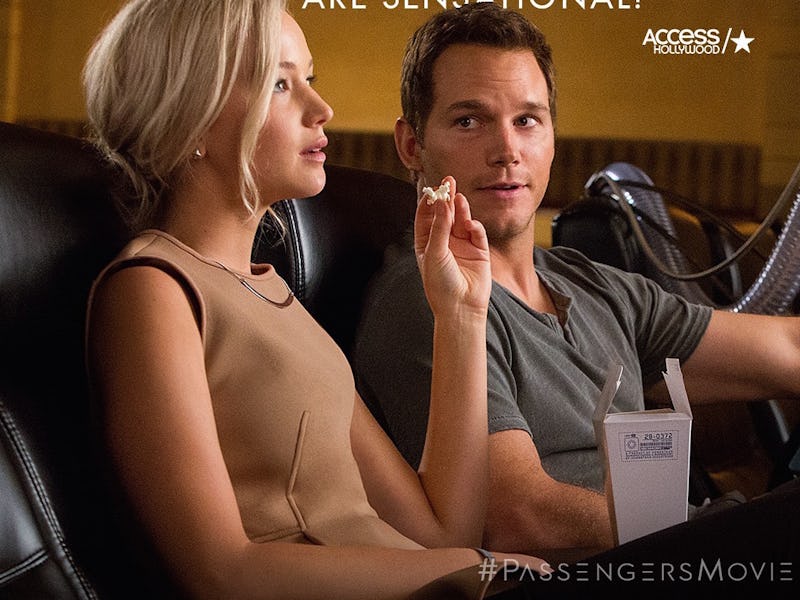Why Sci-Fi Romance Films Aren't Popular Among Adults
'Passengers' is only the latest movie to show how hard it is to blend science fiction and romance.

Sex and romance in adult science fiction is a difficult sell, for a number of reasons. Depending on the environment — space, digital worlds, robot theme parks — it’s logistically complicated. Depending on the characters, sex can be anatomically confusing and riddled with consent issues. But most of all, it’s hard to nail in a satisfying way on a story level. The latest movie about the subject, the Chris Pratt and Jennifer Lawrence vehicle Passengers, only underscores this problem.
The relationship between the characters in Passengers rests on an uneasy foundation of obsession and coercion. Both are in a cryogenic sleep on a space ship bound for a distant Earth colony, but Pratt’s character accidentally wakes up years too early. As a result, he’s doomed to live out his days without companionship and die before reaching their destination. To solve this problem, he wakes up Lawrence’s character too, deceives her about the nature of her awakening, and charms her into a sexual relationship. If the film explored this with depth and self-awareness, it would be a provocative story, but it shies away from addressing it in any meaningful way. The result is a tone-deaf tale that’s far darker than it intends to be.
Passengers is just the latest example of flat, flawed sci-fi romance marketed toward an adult audience. The Age of Adaline — a Benjamin Button-esque tale about an ageless Blake Lively who has a relationship with both a father and his son years later — also comes accompanied by squishy logic. Darren Aronofsky’s The Fountain is engaging and mesmerizing, but loses its disparate plot threads when it travels down a rabbit hole of Hugh Jackman transcendental tree sex in a space bubble. The Philip K. Dick adaptation The Adjustment Bureau straddles an awkward tone between old-fashioned star-crossed romantic melodrama and a conspiracy thriller. As a result, both areas are underserved.
Matt Damon and Emily Blunt in 'The Adjustment Bureau'
This isn’t to say science fiction should avoid romance. Television shows like The 100, Outlander, and Westworld all have nuanced sexual politics. In film franchises, almost every teen dystopia has a romance subplot (the love triangle between Katniss, Peta, and Gale in The Hunger Games; the relationship between Tris and Four in Divergent). But sub-plot is the key word here.
When it’s the primary plot, braiding romance together with science fiction requires a particular alchemy in order to succeed. It’s a combination bound for tension between warm sentiment and cold logic; between emphasizing interpersonal relationships and emphasizing detailed distant worlds. Passengers shows the pitfall of this tension because it is unwilling to truly engage with the issues it raises on consent and agency.
It has the formula of a rom-com like 10 Things I Hate About You or She’s All That — in which the girl finds out about the boy’s deception and he must win her back — but the life-or-death stakes of a sci-fi space epic. The “will he win her back?” is usually a cute question in rom-coms, but it rings hollow when his “sin” wasn’t a bet about the prom, but removing her very autonomy and endangering her life.
When it’s handled with care, issues of consent and deception between partners is a rich area for sci-fi romance. Movies like The Lobster and Her succeed where Passengers fails because their sci-fi and romantic aspects mold to their established worlds, rather than the other way around. The Lobster works because Colin Farrell and Rachel Weisz’s characters romantic relationship is an organic symptom of the story’s world. It’s so bizarre that blends seamlessly with its sci-fi aspects, rather than clashing with them.
At one point in The Lobster, it comes to light that Ben Whishaw’s character has been deceiving his partner. In a world where partners are together because of arbitrary traits — both have limps; both are near-sighted — Wishaw’s character pairs off with a woman who suffers from frequent nosebleeds. He fakes the ailment in order to marry her. She’s notably upset when she discovers their relationship is based on deception. Unlike Passengers, this is not brushed off with a rom-com tone that clashes with the situation. Because the entire story of The Lobster is darkly comedic and slyly self-aware, the deception is woven seamlessly into the story.
Similarly, in Her, when Joaquin Phoenix’s character finds out that the Siri-like voice he’s fallen in love with has been having similar relationships with thousands of others, he’s heartbroken. But because it fits the melancholy tone of the world and the movie doesn’t try to gloss over it, Her is able to comment on the odd nature of their connection rather than circle it aimlessly like Passengers. Passengers is not a great movie, or even a good movie. But if it can draw a spotlight on an intriguingly underserved genre; a genre that is among the most innovative when it lands well, its journey is not in vain.